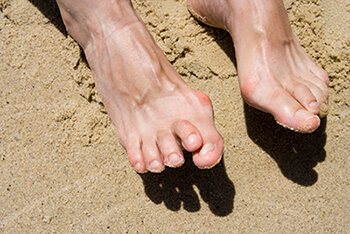Hammertoes causes, risks, prevention and treatment
 Hammertoes can be identified by an abnormal bend in the middle joint of the toe. This abnormal bending can lead to added pressure on the toe when wearing shoes. It can also cause pain or discomfort when walking or running. Because hammertoes typically worsen overtime and become increasingly more rigid, it’s recommended that you seek the help of a podiatrist for treatment options if you believe you’re experiencing the symptoms of this deformity.
Hammertoes can be identified by an abnormal bend in the middle joint of the toe. This abnormal bending can lead to added pressure on the toe when wearing shoes. It can also cause pain or discomfort when walking or running. Because hammertoes typically worsen overtime and become increasingly more rigid, it’s recommended that you seek the help of a podiatrist for treatment options if you believe you’re experiencing the symptoms of this deformity.
Those experiencing hammertoe may also find other foot related issues that come with this condition, such as corns or calluses. Some factors that may influence your likelihood of getting hammertoe include old age, toe length, improper footwear, and genetics. Those who have diabetes or arthritis are also more likely to have foot related complications, including hammertoe.
There are risk factors that may make you more likely to develop this condition. Women are more likely to have the condition compared to men. Hammertoe is also more likely to appear in those who are older in age.
To help better prevent yourself from getting hammertoe, it’s recommended that you avoid wearing shoes that limit the room for your toes. Footwear with low heels, as well as adjustable straps or laces, can be useful when it comes to providing your feet with ample room to move. Buying shoes that fit are also important, which is why we recommend shopping at the end of the day when your feet are at their largest. This helps you avoid choosing a shoe too small for your feet.
Orthotics, as well as medical pads for corns and calluses that may develop due to your hammertoe, are recommended to help relieve discomfort. Light toe exercises may also be helpful for strengthening the muscles and mobility of your toes.
Hammertoes Diagnosis
To diagnose someone with hammertoe, your podiatrist will need to conduct a thorough examination of your foot. Your doctor may even order an x-ray to evaluate the bones and joints of your feet and toes.
For a proper diagnosis and recommended treatment plan, we suggest you consult with a podiatrist for professional help and care.
